Living with Mild Cognitive Impairment by Anderson Nicole D.;Murphy Kelly J.;Troyer Angela K.;

Author:Anderson, Nicole D.;Murphy, Kelly J.;Troyer, Angela K.;
Language: eng
Format: epub
Publisher: Oxford University Press, Incorporated
Published: 2012-08-15T00:00:00+00:00
SLEEP
Getting a good nightâs sleep is also very important to your ability to feel more positive. In chapter 8 we told you that sleep patterns shift as we age and that people with MCI often report experiencing difficulty either falling asleep, staying asleep during the night, or waking up too early. We also pointed out that sleep is a critical component to your physical and emotional health and to your memory functioning.
Given the importance of sleep to health and well-being, we wanted to make sure you knew about some simple things that can help improve your ability to sleep at night. See Box 9.4 for guidelines to improve your sleep habits or sleep hygiene, as well as the recommended reading by Silberman listed in chapter 8. These involve controlling aspects of your environment and your behavior that can impact your sleep. In order for these techniques to work, you have to be disciplined about doing them; you canât just do them when they are convenient. If you are committed to making these simple changes, though, you should soon find that you are sleeping better at night and waking up feeling more refreshed.
It is recommended that adults get at least seven hours of sleep per night, though some individuals may need more and others can manage with a bit less. You may ask yourself, What can a good nightâs sleep really do for me? A lot. When you are asleep your body is engaged in many restorative functions that include producing proteins that repair cell damage and producing chemicals. Examples of these chemicals are melatonin (a hormone involved in sleep-cycle regulation and immune-system function among other things) and serotonin (a hormone with many functions, most importantly enabling communication between nerve cells, but also regulating your mood state, with low levels of serotonin being associated with depressed mood). If you donât get enough sleep, then your body is stressed (it has to carry an increased burden) because it doesnât have enough time to take care of all the daily wear and tear. When your body is stressed due to lack of sleep, more stress hormones are released, like cortisol. As a consequence, regulation of your blood pressure and cholesterol, your mood, and how effective you are at responding to stress, is not as efficient. We told you in chapter 8 that your memory also doesnât function as efficiently when you havenât had enough sleep. Lack of sleep reduces your bodyâs effectiveness at performing all the restorative functions, and this can make you more prone to medical conditions like heart disease and stroke and to mood problems like depression and anxiety. In short, sleep acts like a buffer to help your body and mind function optimally regardless of what the day throws your way.
Box 9.4 The Dos and Donâts of Good Sleep Habits
⢠Do eat a light snack before bedtime if you would otherwise be hungry, but donât eat a large meal just before bedtime.
⢠Donât drink alcohol right before bedtime. Alcohol may induce sleep, but it will disrupt sleep later in the night.
Download
This site does not store any files on its server. We only index and link to content provided by other sites. Please contact the content providers to delete copyright contents if any and email us, we'll remove relevant links or contents immediately.
The Art of Thinking Clearly by Rolf Dobelli(9910)
The 5 Love Languages: The Secret to Love That Lasts by Gary Chapman(9277)
Mindhunter: Inside the FBI's Elite Serial Crime Unit by John E. Douglas & Mark Olshaker(8699)
Becoming Supernatural by Dr. Joe Dispenza(7833)
The Road Less Traveled by M. Scott Peck(7278)
Nudge - Improving Decisions about Health, Wealth, and Happiness by Thaler Sunstein(7242)
Mastermind: How to Think Like Sherlock Holmes by Maria Konnikova(6936)
Enlightenment Now: The Case for Reason, Science, Humanism, and Progress by Steven Pinker(6871)
Win Bigly by Scott Adams(6827)
The Way of Zen by Alan W. Watts(6288)
Factfulness: Ten Reasons We're Wrong About the World – and Why Things Are Better Than You Think by Hans Rosling(4487)
The State of Affairs by Esther Perel(4485)
Gerald's Game by Stephen King(4374)
Man's Search for Meaning by Viktor Frankl(4271)
The Confidence Code by Katty Kay(4038)
Thinking in Bets by Annie Duke(3996)
The Worm at the Core by Sheldon Solomon(3325)
Hidden Persuasion: 33 psychological influence techniques in advertising by Marc Andrews & Matthijs van Leeuwen & Rick van Baaren(3292)
Enlightenment Now by Steven Pinker(3271)
